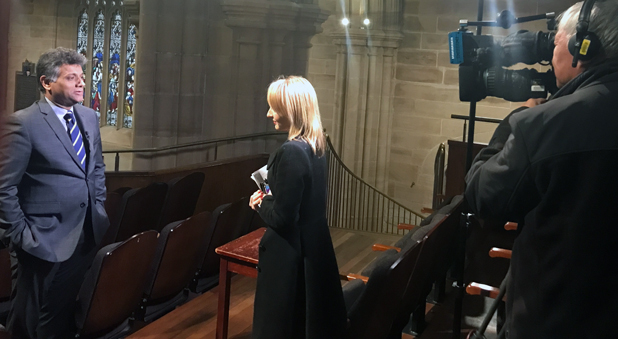The latest census figures showing a rise in the number of people reporting no religious affiliation do not show Australia is losing faith, according to the Dean of Sydney, Kanishka Raffel.
2016 Census figures, released today show the proportion of people reporting no religion increased to 30 percent in 2016 - up eight percent in five years, and nearly double the 16 per cent recorded in the 2001 census.
The Dean says Australia is still a predominantly religious country. “Over 60 percent of people said they had some affiliation with religion and the number of people who say they have no religion - it doesn't really tell us much about them. Some of those people are decided Atheists perhaps, many are just not committed and we know that some of those people would certainly say they have a spirituality, some kind of connection with God but they just don't identify with institutional religion. So I think that number is a bit opaque, we don't get the whole picture from the figures.” Dean Raffel said.
The census form also changed last year, putting 'no religion' as the top choice. Over half of the population and the majority of those identifying a religion, claim Christianity. That figure is 51 percent of the population, compared to 74 percent in 1991 and 88 percent who identified as Christian 50 years ago.
The number of Catholics dropped from 25.3 per cent to 22.6 per cent and Anglicans from 17.1% in 2011 to 13% last year. Islam at 2.6 per cent and Buddhism at 2.4 per cent were the next most common religions, with Islam up half a percent in five years and Buddhism down point one of one percent. Hinduism is the fastest growing religion. New South Wales is the most religious state with 66 percent of the population claiming to be religious.
“60 percent of people say they identify with some religion and for more than 50 percent that's Christianity. This means that religion is important to a lot of people and so there is quite properly a religious perspective on the topics of importance in our society.” the Dean told SBS news (see photo above).
The Dean says the figures tell us something important about our culture. “I think we can get very distorted impressions. Most people don't necessarily say a lot about their religion and that might make you think people aren't religious. But if you ask them - you find something that is personally important to them and is no doubt shaping their whole engagement with the community, even if they are not wearing it on their sleeve. So, I think it is worth knowing (the figures) so we get a clearer picture of the things that are most important to a large number of people.”
The Dean says the fact that one in five migrants are from Asia or the subcontinent, is being reflected in churches. “The census tells us that there are now more migrants from India and China than there are from England and Europe and we are certainly seeing that at the Cathedral. People who might not necessarily have had much contact with Christianity in the past in their own home countries are very eager to find out about Jesus and so we have a large number of Sub-Continental and South East Asian people coming really with questions about who Jesus is and what he is about. We are really delighted with that and seeing that change being reflected here at the Cathedral and in many Anglican churches around Sydney.
Dean Raffel also believes there has been an increase in commitment among those who do claim adherence to Christianity.
“I think it's true that in the 1960's there would have been a higher proportion of people saying that they identified with the Christian religion and that number is certainly smaller now but those people are more deliberate and intentional. It is not just a matter of habit or social expectation, but there's something personal and important going on for people when they take the trouble - as it were - to identify with a local church or a local faith community.”






















